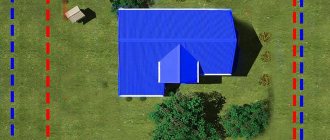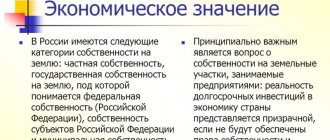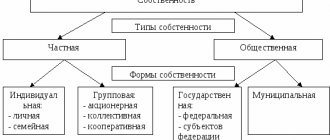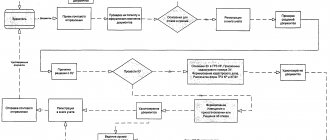Home / Real estate / Land / Ownership / Forms of ownership
Back
Published: 06/07/2017
Reading time: 10 min
0
840
The land resources of the entire country cannot be concentrated in the hands of just one government agency. Due to the existence of many subjects in Russia, land plots are also distributed on an administrative-territorial basis.
This process is called the delimitation of state ownership of land. More details about this mechanism later in the article.
- What is the delimitation of state ownership of land?
- Participants
- Legislation
- What state lands are subject to delimitation?
- The procedure for delimiting state land
- Principles for delimiting state-owned lands
- Problems of delimitation of state ownership of land
Evolution of the concept of state ownership of land
The legislator recognizes land and other natural resources as the basis for the life of the peoples of Russia: the relevant provisions are reflected in Art. 9 of the Constitution of the Russian Federation. The official legal doctrine of the Soviet period classified land, subsoil, water and wildlife in their natural state as the people's property.
Art. 10 of the 1977 USSR Constitution declared the inalienable right of peoples to own, use and dispose of the lands on which they live. The land fund was under the jurisdiction of the Councils of People's Deputies, empowered to transfer them to citizens, enterprises and institutions exclusively for use.
Postulates of Soviet law:
- recognition of land and other natural resources as an object of exclusive state property;
- community of land resources, absolute publicity of their legal regime;
- non-recognition of the possibility of land, real estate, and means of production being in the hands of private owners;
- withdrawal of land plots from civil circulation.
After the change in the state system, the ideological concept, in which land was simultaneously recognized as the property of the people and the property of the state, was criticized. After all, it is obvious that the state and the people cannot be identified. Many civil rights scholars even declare that such a category as “national property” is meaningless.
Meanwhile, the Soviet approach reflects the special importance of the land fund for the development of the state and society. It cannot be denied that decision-making regarding land plots requires taking into account not only private, but also public interests. Today, the prerequisites for the formation of a qualitatively new model of state property and public domain, which do not deny each other, are visible.
The concept of state ownership of land
The collapse of the USSR marked the end of the state monopoly on land resources. They may belong to municipalities or be in private hands. All forms of property are recognized and protected equally (Articles 8, 9 of the Constitution of the Russian Federation).
There is no definition of state ownership of land in the legislation.
Part 2 of Article 214 of the Civil Code and Part 1 of Art. 16 of the Land Code establishes that lands that do not belong to citizens, organizations and municipalities are owned by the state. This provision became generally binding on January 1, 1995 with the entry into force of Part I of the Civil Code of the Russian Federation. The regulations of the Land Code of the Russian Federation came into force on October 29, 2001.
The legislator establishes state ownership on a residual basis. However, this does not at all indicate its insignificance. On the contrary, the state land fund forms the basis of the country's sovereignty and economy. There are objective reasons for using the residual principle to distinguish state lands from private and municipal ones.
- The competence of the Russian Federation extends to all lands located within its sovereign territory. Some of them are virgin lands; land plots from them have not been formed.
- According to Art. 131 of the Civil Code of the Russian Federation, rights to real estate (ownership, economic management, permanent use, long-term lease, mortgage, easements) are subject to mandatory state registration. Meanwhile, the land cadastre and real estate register (GKN and Unified State Register) were created only in 1997. Both information resources do not contain information about a huge tract of land.
With a different wording of Art. 214 of the Civil Code of the Russian Federation and Art. 16 of the Land Code of the Russian Federation, it should be assumed that virgin lands do not have an owner, they are “nobody’s”. Such a situation would facilitate their self-seizure with subsequent demands for recognition of ownership on the basis of Art. 234 of the Civil Code of the Russian Federation “Acquisitive prescription”.
Therefore, the use of such a rule-making technique as a residual principle in relation to state-owned lands is not only justified, but is also the only possible option.
Commentary on Article 16 of the Land Code of the Russian Federation
State ownership of land has a complex composition. According to Art. 214 of the Civil Code of the Russian Federation, state property in the Russian Federation is considered to be property owned by the Russian Federation (federal property), and property owned by subjects of the Russian Federation - republics, territories, regions, cities of federal significance, autonomous regions, autonomous districts (property of the subject RF).
On behalf of the Russian Federation and the constituent entities of the Russian Federation, the rights of the owner are exercised by public authorities within the limits of their competence established by acts defining the status of these bodies.
In cases and in the manner provided for by federal laws, decrees of the President of the Russian Federation and decrees of the Government of the Russian Federation, regulatory acts of constituent entities of the Russian Federation, on their special instructions, state bodies, local government bodies, as well as legal entities and citizens can act on their behalf (Article 125 of the Civil Code RF).
The Russian Federation and its constituent entities manage and dispose of land plots in their ownership. Such plots are directly owned and used by legal entities and citizens, to whom state-owned land plots are provided for use, lifelong inheritable possession and lease.
The state (represented by the Russian Federation and its constituent entities) in land relations can act in one of two roles: as a subject of state power, establishing the norms of land legislation, exercising state control over the use of land and other functions named in Art. Art. 9 - 10 of the Land Code of the Russian Federation, and as the owner of land plots - in the latter case, it enjoys the same rights and bears the same responsibilities as other owners of land plots.
In accordance with Art. 124 of the Civil Code of the Russian Federation, when concluding transactions with land and in other relations regulated by civil legislation, the Russian Federation and its subjects act on an equal footing with other participants in these relations - citizens and legal entities.
In the Soviet Union, under the conditions of the existence of exclusive state ownership of land, there was a single state land fund, which was not divided into the property of the USSR itself and the property of the union republics.
With the formation of the independent state of the Russian Federation, its constituent republics, territories, regions, autonomous regions, autonomous districts, the cities of Moscow and St. Petersburg were recognized as subjects of the Russian Federation, having the right of state ownership of land. The problem arose of delimiting state ownership of land between the Russian Federation and its constituent entities.
For the first time, federal lands were allocated by Decree of the President of the Russian Federation of December 16, 1993 N 2144 “On federal natural resources”, however, the procedure for delimiting state ownership of land was established only by the Federal Law of July 17, 2001 N 101-FZ “On the delimitation of state land ownership."
In accordance with it, the basis for state registration of property rights were acts of the Government of the Russian Federation on the approval of lists of land plots, for which, respectively, the Russian Federation, constituent entities of the Russian Federation and municipalities acquired ownership rights when delimiting state ownership of land, as well as court decisions on disputes that entered into legal force related to the delimitation of state ownership of land.
These lists were prepared in accordance with the rules approved by the Government of the Russian Federation by a specially authorized federal executive body for property relations together with other federal executive bodies and were coordinated with state authorities of the constituent entities of the Russian Federation and local governments. A number of such lists were approved, but practice has shown that the envisaged procedure for their preparation and approval is so complex that the process of delimiting state ownership of land threatens to drag on for many years.
In connection with this, Federal Law No. 53-FZ of April 17, 2006 “On the delimitation of state ownership of land” was repealed, and the Federal Law on the entry into force of the Land Code of the Russian Federation was supplemented with rules regulating the grounds for such delimitation.
It has been established that acts issued by the Government of the Russian Federation before July 1, 2006 on the approval of lists of land plots for which, respectively, the Russian Federation, constituent entities of the Russian Federation and municipalities acquire ownership rights when delimiting state ownership of land, are the basis for state registration of ownership of land plots , but in the future the registration of this right will be carried out directly if there are grounds specified in the law.
Accordingly, the Federal Law “On state registration of rights to real estate and transactions with it” has been supplemented with a new article. 30.1, according to which state registration of ownership of the Russian Federation, a subject of the Russian Federation or a municipal entity to a land plot when delimiting state ownership of land is carried out on the basis of an application from an executive body of state power or a local government body or a person acting on their behalf.
Such a statement must indicate the basis for the emergence of the right of ownership of the Russian Federation, a constituent entity of the Russian Federation or a municipal entity to the land plot. Decree of the Government of the Russian Federation of June 30, 2006 N 404 approved the list of documents required for state registration of property rights of these entities.
According to paragraph 10 of Art. 3 of the Federal Law “On the entry into force of the Land Code of the Russian Federation”, the absence of state registration of ownership of land plots, state ownership of which is not demarcated, is not an obstacle to their disposal.
However, the disposal of land plots specified in Art. 3.1 of this Federal Law, i.e. those that are classified as federal property, the property of a constituent entity of the Russian Federation or municipal property, is carried out after state registration of ownership of them (unless otherwise provided by federal law).
This clause also establishes the procedure for disposing of such land plots. As a general rule, the disposal of land plots, the state ownership of which is not demarcated, is carried out by local governments of municipal districts and urban districts. However, in settlements that are administrative centers, capitals of constituent entities of the Russian Federation, the disposal of such areas is carried out by local government bodies of these settlements only if the laws of the relevant constituent entities of the Russian Federation do not establish that it is carried out by the executive bodies of state power of the constituent entities of the Russian Federation.
At the same time, in the cities of Moscow and St. Petersburg, the disposal of land plots, state ownership of which is not demarcated, is carried out by the executive authorities of these constituent entities of the Russian Federation themselves, however, their laws may establish that these powers are exercised by local governments of intra-city municipalities.
In accordance with the Moscow Law of December 19, 2007 N 48 “On land use in the city of Moscow” (Article 4), executive authorities of the city of Moscow manage land plots owned by the city of Moscow; land plots for which state ownership is not demarcated; other land plots in accordance with federal legislation.
This Law also establishes that in cases where federal laws do not establish the mandatory transfer of land plots owned by the city of Moscow, or land plots for which state ownership is not demarcated, into private ownership, their provision on the right of permanent (perpetual) use or gratuitous fixed-term use, land plots are provided to citizens and legal entities exclusively for rent. At the same time, land plots that are not subject to alienation from state ownership are not leased for construction to citizens and legal entities.
Exceptions to the above rules for delimiting state ownership of land may be provided for by the legislation of the Russian Federation on highways and road activities.
The procedure for determining the amount of rent, as well as the procedure, conditions and terms for paying rent for the use of land plots, state ownership of which is not demarcated, are established by state authorities of the constituent entities of the Russian Federation (unless otherwise provided by the Federal Law “On the State and on Amendments to Certain Legislative acts of the Russian Federation").
In 2014, the Land Code of the Russian Federation was significantly supplemented with several chapters devoted to the regulation of relations related to state and municipal ownership of land: the procedure for providing land plots in state or municipal ownership, establishing easements on such plots was clarified, streamlined and detailed, and existing ones were replenished Until recently, gaps in legislation related to the determination of the procedure for the exchange of land plots in state or municipal ownership for land plots in private ownership, redistribution of lands and land plots in state or municipal ownership, gratuitous transfer of land plots in in federal ownership, in municipal ownership or in the ownership of constituent entities of the Russian Federation; a procedure has been introduced for the use of lands or land plots that are in state or municipal ownership, without the provision of land plots and the establishment of easements (see commentary to chapters V.1 - V.6).
Types of state ownership of land
Exclusive state ownership of land on the territory of the modern Russian Federation arose in 1917, in connection with the adoption of the Decree “On Land” by the Second All-Russian Congress of Soviets. The entire land fund within the borders of the USSR was recognized as a single indivisible object of state property. It was not differentiated between the administrative-territorial units of that time (republics, regions, territories).
Municipal property as a legal phenomenon appeared in Russia relatively recently. Today, state ownership of land cannot be identified with municipal ownership. Types of state property according to law:
- federal;
- subjects of the Russian Federation.
In practice, there is a third type - “general”, physically and legally undivided state property. The phrase “state property” in relation to land in different situations can mean:
- generic concept (federal property + subject property);
- undelimited, existing only de facto state property.
State property of any type may arise:
- on the grounds specified by federal legislation;
- due to the delimitation of state property;
- on the grounds provided for by the Civil Code of the Russian Federation: purchase, exchange, inheritance, donation, redistribution, seizure for public needs.
Special rules apply to the federal cities of Moscow, St. Petersburg and Sevastopol. Refusal by a private owner of a plot located within one of the named constituent entities of the Russian Federation entails its transfer to the disposal of the city. The city authorities of Moscow, St. Petersburg and Sevastopol have the right to establish that in case of refusal, the site becomes directly the property of the municipality on whose territory it is located.
Art. 18 of the Land Code of the Russian Federation provides for the possibility of free transfer of federal lands into the ownership of constituent entities of the Russian Federation. The reverse situation is impossible. As for paid transfers, the constituent entities of the Russian Federation and the central government are free to enter into transactions on this matter within the limits of their competence.
Today, land legislation is in the phase of development and formation. One of its key problems is the delimitation of federal, municipal and subject ownership of land.
Participants
These are:
- Russia;
- each subject separately (including federal cities: Moscow, St. Petersburg and Sevastopol);
- each municipality (city, town, etc.).
Specially authorized authorities - federal, regional and local - whose competence includes resolving land issues at their level, directly enter into legal relations regarding the delimitation of state lands.
Legal regime of state ownership of land
The position of the state as a participant in land relations is characterized by dualism. In private law relations, it acts on an equal basis with other land users; in public law relations, it acts as a subject endowed with authority.
The state has the right to exercise all the usual powers to own, use, and dispose of land resources. It is bound by the intended purpose and permitted uses of the plots belonging to it.
Land on behalf of the state is managed by executive authorities according to their competence. The latter, among other things, are authorized to transfer state fund lands into ownership, paid or gratuitous use. Art. 71 of the Constitution of the Russian Federation declares the principle of separate land management, according to which state structures of different levels manage federal and subject property. However, in most cases it is not implemented.
Being a subject of power, the state can seize a land plot due to its improper use (Articles 284–286 of the Civil Code of the Russian Federation). Motivating their actions by public needs, authorized government agencies have the right to initiate the termination of private ownership of land without any violations on the part of the landowner (Article 282 of the Civil Code of the Russian Federation). The actions of the authorities may be accompanied by the forced seizure of real estate located on such sites (Article 239 of the Civil Code of the Russian Federation).
Today, the lands of the state fund are the most extensive in area. They have exceptional economic and environmental significance. Most industrial enterprises and specially protected areas are located on state lands. According to paragraph 4 of Art. 87 of the Land Code of the Russian Federation, lands occupied by:
- nuclear energy facilities, space activities;
- federal energy systems;
- by means of communication of federal importance;
- objects that ensure defense capability and protection of the state border.
A feature of the legal regime of lands in municipal and state ownership is also:
- the possibility of their privatization, receipt for indefinite and fixed-term free use;
- predominantly competitive procedure for concluding lease agreements.
Formation of land plots from state-owned lands
In relation to the state, it is important to understand the difference between two concepts: “ownership of land,” which has a public law connotation, and “ownership of a land plot,” which has a private law connotation. In order to use the land it owns in one way or another, the state needs to create land plots and establish their intended purpose.
However, the state simultaneously owns a huge tract of virgin land that is not involved in economic turnover. In the latter case, we are talking about land ownership. For comparison: a private person can only be the owner of a plot. Ownership rights to land in the considered understanding cannot arise for a citizen or organization.
The legal regulation of the formation of plots from state-owned land is provided by Art. 11.3 Land Code of the Russian Federation.
They are special in relation to the general rules specified in Art. 11.2 of this Code have priority in application.
As a general rule, the formation of plots of state-owned land is carried out on the basis of decisions of executive authorities at the appropriate level.
Exception: the formation of plots within built-up areas in respect of which a decision on development has been made in accordance with the Town Planning Code of the Russian Federation. In this case, the decision is made by the person with whom the agreement on the development of such a territory was concluded (Clause 7, Article 11.2 of the Civil Code of the Russian Federation). The decision of the business entity must comply with the documentation on the planning of the territory. Otherwise, it may be canceled in court.
Authorized government agencies are free to make decisions on the primary formation of virgin land plots at their own discretion, or, alternatively, on the initiative of persons interested in providing them for ownership or use. If we are talking about the transformation of existing plots, the consent of all land users (tenants; citizens to whom the plots are provided for lifelong inheritable ownership, etc.) is required.
Consent is not requested:
- for persons in whose favor an easement has been established, since the easements continue to operate within the same boundaries even after the transformation of the plots;
- from state unitary enterprises, since the state is their only founder;
- in case of transformation of plots by court decision;
- when a plot is taken for public use.
The formation of state property plots occurs on the basis of one of the following documents:
- territory surveying project;
- design documentation of the forest area;
- diagram of the location of the site on the cadastral plan of the territory.
An approved land surveying project is required in cases where a newly formed area of state property is located within the boundaries of:
- territory subject to comprehensive development;
- territory in respect of which an integrated development agreement has been concluded;
- lands provided for gardening, truck farming, dacha management;
- block, another element of the planning structure, built up with multi-apartment buildings.
Principles for delimiting state-owned lands
The principles of delimitation mean certain fundamental legal provisions on which the process of delimiting state lands is based. There are a number of such regulative principles.
- Consolidation at the level of the Constitution of the Russian Federation of the powers of state bodies in the field of delimitation of state-owned lands. Such powers are assigned to the joint jurisdiction of the Russian Federation and its constituent entities.
- The priority in regulating the issue of delimitation is precisely federal laws. Primary control of the process of delimitation of state lands by a specialized authority - the Federal Property Management Agency, as well as the responsibility of officials in the performance of the powers assigned to them.
- Gratuitous basis for the acquisition of land plots as a result of delimitation.
- The unity of the procedure for registering ownership of a demarcated plot: carrying out land management work, cadastral registration and state registration must be the same for all participants in the demarcation process.
- Ensuring and preserving the rights and interests of citizens and legal entities to land properties.
- Preservation of the intended purpose of the plots in accordance with land legislation.
- Preservation and consideration of the importance of land plots in the field of economy, history and strategic development of the country.
- Legislative regulation of the treatment of undelimited lands.
It is possible that in the process of improving the procedure for delimiting the lands of our state, new principles will appear.
The use of public land in SNT has its own characteristics. Find out everything about the procedure for taking out a site in nature in our article! You will find a lot of necessary information about the importance of the situational plan during gasification of the site here.
Provision of land from state ownership
One of the features of public land ownership is the limited administrative discretion of authorized government agencies.
A private owner is free to dispose of his land, within the framework of the law, as he wishes. He decides for himself whether to lease the land to him or not, with whom to enter into an agreement, and what payment to request. The executive body, on the contrary:
- often cannot refuse to provide ownership or use of a plot of land to an interested person;
- forced to calculate rent according to government-approved methods;
- as a general rule, selects a counterparty through a competitive process (through an auction);
- in some cases it is obliged to provide land free of charge.
The legal grounds for obtaining plots from state-owned land are stipulated in Art. 39.1 Land Code of the Russian Federation. Among them:
- lease agreement;
- free use agreement;
- civil purchase and sale agreement;
- decision of the authorized government agency in the event of land privatization and provision of it for permanent free use.
What territories can be municipally owned?
So, we have looked at the cases in which lands are state property - subject to their delimitation in the manner prescribed by law at the federal or regional level. In turn, municipalities, by law, function independently of government agencies.
When delimiting state ownership of land, the following may be transferred to the ownership of local authorities:
- areas occupied by buildings and structures owned by municipalities;
- territories that are provided to local authorities, municipal enterprises or NPOs created at the appropriate level.
Law on the delimitation of state ownership of land
One of the stages in the implementation of land reform in the Russian Federation was the adoption of 07.17.01 Federal Law-101 “On the delimitation of state ownership of land.” The normative act came into force on January 20, 2002, six months after its official publication. It lost force on July 1, 2006, due to the adoption of No. 53-FZ, which simultaneously introduced changes to the Land Code of the Russian Federation and the legal regulation of the state registration system of real estate.
The volume of Federal Law No. 101-FZ was small: it consisted of a preamble and 8 articles, one of which was devoted to its implementation. Three key articles (3–5) were devoted to the grounds for including plots in the list of lands to which the right of federal, subject and municipal property arises.
Art. 6 of the Law regulated the procedure for delimiting areas of state property, Art. 7 of this Law is a method of resolving disputes. It is noteworthy that neither 101-FZ nor the by-laws adopted to develop its provisions established temporary boundaries for the delimitation of state-owned lands.
The Law in question was intended to involve municipalities in the delimitation of state property rights and to create a legal basis for this process. One of the prerequisites for its adoption is the negative trend that developed in the regions by 2000.
Incorrectly interpreting the Constitution, a number of subjects of the Russian Federation considered that they had the right to dispose of all natural resources (including land) within their territory. The Resolution of the Constitutional Court of the Russian Federation dated June 7, 2000 No. 10-P and No. 92-O dated June 27, 2000 were devoted to explaining the incorrectness of this approach.
Delineation of state ownership of land: the current stage
At the moment, 101-FZ has lost force (some of its provisions have been transferred to the Land Code of the Russian Federation), and in Russia a huge tract of state-owned land remains undemarcated. In order not to slow down civil turnover, the Federal Law “On the Entry into Force of the Land Code of the Russian Federation” introduced permission to form plots from lands that are in undelimited public ownership, even in the absence of state registration for such lands in the Unified State Register.
The disposal of undelimited lands in the administrative centers and capitals of the constituent entities of the Russian Federation is carried out by their self-government bodies. Regional legislation may provide that such areas are managed by the executive authorities of the constituent entities of the Russian Federation.
Domestic civil and land legislation recognizes the principle of the unity of fate of land plots and real estate located on it.
Thus, the classification of a site as federal or subject property is largely determined by the ownership of the buildings, structures, various kinds of linear objects, and communications located on it.
The criteria for delimiting lands occupied by water bodies stem from the contents of the Water Code of the Russian Federation. According to the Forest Code of the Russian Federation, the forest fund is recognized as federal property. The right of the central government to transfer parts of the forest fund to the constituent entities of the Russian Federation is recognized. Moreover, both of these Codes imply joint decision-making by central and regional authorities on issues of the legal regime of lands, regardless of the actual delimitation.
It is worth noting that some of the lands within the territory of the Russian Federation have already been demarcated. Until 2006, the practice was to approve lists of sites classified as federal or subject property.
Transfer of land and operation of previous legislation
It should be noted that the Land Code separately regulates how state property is delimited if the participants in the relevant legal relations acquired land in accordance with the rules of law in force before 2006. In this case, acts previously issued by the government of the Russian Federation certifying the lists of sites for which the federal, regional or municipal authorities had the right of ownership should be considered as grounds for state registration of ownership of the corresponding territories.
State registration of land ownership
It should be clear: it is not land as such that is subject to state registration, but land plots. They are the ones in the understanding of Art. 131, 132 of the Civil Code of the Russian Federation are real estate from a legal point of view. State registration of virgin lands is impossible, since in relation to it it is impossible to establish the existence of an individually defined thing as an object of law.
There are two registries in Russia, created in 2007:
- The GKN (state real estate cadastre) contains mainly technical information that allows you to determine the location of the site on the ground and the permitted methods of its use. Some of the state cadastre data are temporary. They may relate to preliminary approvals and grounds for state registration in the Unified State Register. If after a certain period (usually 2 years) state registration has not been carried out, this data is automatically excluded from the State Property Committee.
- The Unified State Register of Property Rights (USRP) contains mainly information of a legal nature - about ownership, long-term (more than a year) lease, permanent use. Data on mortgages, encumbrances, and easements are also entered into the state register. The legal consequences of land transactions occur only after their state registration (Article 164 of the Civil Code of the Russian Federation). This provision also applies to cases where the land agreement is certified by a notary.
Owners of plots, the rights to which arose before the creation of the Unified State Register, are not required to initiate the entry of information about their rights into the state register. If the last legally significant actions with the land (transfer of ownership, encumbrance, mortgage) occurred before 2007, there is no information about such a plot in the Unified State Register.
However, this does not in any way affect the scope of the owner's rights. Sooner or later, the land will be re-registered due to alienation, inheritance, mortgage or other things. The procedure for registering a new right will be two-stage:
- entering information about the primary right (carried out without paying a state fee);
- recording its encumbrance, transfer or termination.
The procedure for state registration of ownership of a plot is regulated by Art. 22.2 of the Land Code of the Russian Federation. The grounds for such actions (non-exhaustive list):
- decision to approve the layout of the site on the cadastral plan;
- decision on preliminary approval of provision and decision on free transfer (in relation to public lands);
- decision on seizure for public needs;
- agreement on division, merger, redistribution.
State registration is carried out by application. The interested party pays a state fee for carrying out registration actions. The application is accompanied by title documentation and written consents of the copyright holders. State registration of the transfer of rights to a plot entails the transfer of information about all acquisitions.
Certificate of state registration of land ownership
The issue of issuing a title document of this type is regulated by Art. 14 122-FZ “On state registration of rights to real estate and transactions with it.” Starting from July 23, 2013, the applicant has the right, at his choice, to receive (one of two):
- certificate of state registration of rights in the form of a paper document;
- an extract from the Unified State Register, in the form of a traditional paper or digitized electronic document.
If the legal basis for making changes to the register is a civil transaction, the fact of state registration is also certified:
- placing a registration mark on a paper document;
- signing an electronic document with an enhanced qualified electronic digital signature of the state registrar.
With the advent of the Unified State Register system, the state registration certificate lost its primary importance. If a paper document is lost, it can always be restored by receiving a new certificate or extract. It is enough to contact the territorial body of Rosreestr or the MFC.
State act on land ownership
Like the state registration certificate discussed in the previous paragraph, the state act on land ownership is a title document. The difference is that the act is an old-style document.
According to Federal Law No. 137 “On the entry into force of the Land Code of the Russian Federation,” state acts, certificates and other papers confirming rights to land issued to citizens and organizations before 1998 have equal legal force with entries in the Unified State Register.
The law contains a complete list of such documents. Among them is a state act on the right of ownership of land in the form approved by Decree of the Government of the Russian Federation of March 19, 1992 No. 177. Consequently, the act in hand is an independent, sufficient and appropriate document confirming the title. It is not subject to mandatory replacement.
Author of the article
What state lands are subject to delimitation?
State ownership includes only those land plots that do not belong to citizens, legal entities, or municipalities.
Firstly, those state lands, information on ownership of
which are not contained in the Unified State Register of Real Estate. That is, their official affiliation has not been established either with the Russian Federation, or with any subject of the Russian Federation, or with an urban or rural settlement.
And, secondly, areas registered in the Unified State Register can be demarcated. That is, they are distributed by the Russian Federation and transferred to constituent entities or municipalities.









